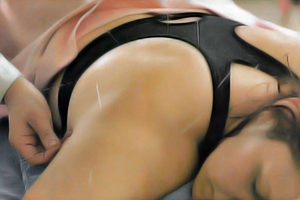Reproduced with permission from the Lafayette Joural and Courier, HEALTH & FITNESS, TUESDAY, MARCH 23, 2004

Dr. Angelica Kokkalis inserts acupuncture needles into Serene Ross, a Purdue graduate who is expected to throw javelin in the summer Olympics. Ross is rehabilitating from surgery on a torn ligament in her throwing arm.
It’s “not voodoo; it’s another way of healing,” says Ross, who underwent surgery to mend a torn ligament in her throwing arm.
Her coach, Purdue javelin coach Rodney Zuyderwyk, says he’s confident she’ll make the U.S. team that will compete in Athens in September. This past winter, she was throwing rubber-tipped practice javelins indoors further than she did at the same point in 2002.
“Everything is strong, and her technique is better than it used to be,” he says.
In 2002, Ross, of West Lafayette, became the NCAA champion with a throw of 195 feet, 8 inches, shattering the American record of 192 feet, 3 inches. Less than a month later, she won the U.S. Championships with a throw of 197 feet.
“I was on fire,” says Ross, now 26 and a rock-solid 5 foot 10, 207 pounds. “I’d step onto the runway, and no one wanted to be there. After one throw at the (U.S. Championships) it was over.”
At the World Cup in Madrid in September 2002, she opened with a throw of 183 feet. On the second throw, she dropped her light arm too much, came over too hard on her left leg and felt a “pop” in her right elbow. She made two more throws and finished fifth in the world.
The 2002 Purdue graduate continued to train, but suspected that something was wrong. Doctors found that she had torn the ligament in her throwing arm.
“I thought, ‘This is not happening,’ ” she says.
In December 2002, surgeons mended her elbow with ligament taken from her leg. When the bandages came off, her world-class arm was withered and weak. Previous injuries to her knee and back hurt. Barely able to walk, she was depressed and withdrawn. She didn’t want to talk about it.
“I was a mess,” she says. “I felt I was losing everything.”
But ever the competitor, Ross has spent more than a year get-ting better through rehabilita-tion, throwing, weight lifting, massage, chiropractic and acupuncture.
Her strategy is simple, she says: “You visualize where you need to be, and you put all your cookies in one jar.”
“She’s gone through a pretty rigorous rehabilitation. There’s been a slow progression, week to week,” Zuyderwyk says. “That competitive spirit is definitely what motivates her.”
Ross is $40,000 in debt and soliciting donations to pay her expenses to meets in Texas and Kansas in April. A good showing there would qualify her for the U.S. Olympic Trials July 9-11 in Sacramento, Calif.
The top one, two, three or four javelin throwers there will represent the United States at the 2004 Olympics this fall.
“I am so ready to go,” Ross says. “I need to get out on the runway and throw.
I’ve been out so long, but I’m still Number 2 in the nation. Only one person has beaten 197 feet,” she says.
Kim Kreiner, a 2000 Kent State University graduate, had a throw of 199 feet, 8 inches in August 2003.
A native of Edinburg, Pa., Ross took up the javelin in 10th grade. At Purdue, she was Big Ten champion twice and a four-time AU-Amer-ican. She always dreamed of competing in the Olympics.
Ross credits acupuncture for much of her recovery. She was introduced to it in California, where she underwent rehabilitation at the Olympic Training Center.
In April 2003, she was referred to West Lafayette’s Dr. Angelica Kokkalis.
“We have an unbelievable relationship as doctor-patient and as friends,” Ross says of Kokkalis. I’ve made unbelievable progress. I feel more balanced, more centered. I’ve healed.”
Kokkalis inserts approximately 60 super-fine disposable acupuncture needles into various parts of Ross’s skin, at different angles. They stimulate the nervous system and its energy to release substances to the blood that kill pain and reduce inflammation.
As the needles are inserted, Ross feels heat and sensations of energy movement, but no pain. She leaves feeling refreshed and relaxed.
Kokkalis is a doctor of Oriental medicine, specializing in pain control and wellness management. She has a practice at Meridian Health Care in Lebanon.
She spent years in China, learning traditional Chinese medicine and formerly was director of Chinese medicine at the Center for Complimentary Medicine and Pain Management at St. Vincent’s Hospital in Indianapolis.
Speaking of Ross, Kokkalis says, “She not only was Number 1, she still is. Her recovery is a miracle.”
Ross’s Olympic dream has provided a motivator like no other.
“She wouldn’t have recovered if she didn’t want this,” Kokkalis says.
A native of Greece, Kokkalis will accompany Ross to Athens if she makes the team so acupuncture treatments can continue.
Ross works out at Purdue, where Jim Lathrop is her weight coach.
She turns to Michael Tebo for massage therapy. Michael Haville is her chiropractor.
“She has put in a lot of hard work, and she has been very patient,” says Zuyderwyk, who works with her almost daily. “That competitive spirit is what allows her to not hesitate when other people with that kind of injury would protect themselves.”
Throughout, he says, “the Olympics has basically been her drive, getting ready for the Olympics … she is on track:”
As the U.S. trials get closer, she’s determined to stay focused, get plenty of sleep and concentrate on staying healthy and strong. She’s a volunteer coach at Purdue.
She says herjob as a part-time social worker with Community Ventures in Living is providing an invaluable perspective. She helps handicapped people with basic living skills.
“I’ve become more thankful,” Ross says. “Some of these people can’t get out of their chair. Some can never walk or even talk.”
She calls the last Yk years of her life “a hard road,” but she’s convinced that it all happened for a reason.
Because of her injury, she has overcome challenges, grown stronger and made priceless friendships.
“I have to do this,” she says.”… the competitor in me won’t die.”
